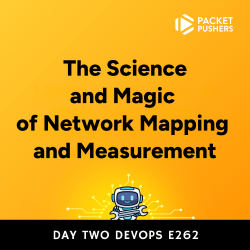


Exploring Internet Equity and Network Magic with Dr. Nick Feamster
In the latest episode of Day Two DevOps we covered some seriously cool stuff about networking, data science, and internet equity with Dr. Nick Feamster. Nick is a computer science professor at the University of Chicago, director of their Internet Equity Initiative, and someone who’s been knee-deep in network measurements and analysis for years. He’s fascinated by how networks work (and don’t work), and his curiosity has led to some groundbreaking projects in internet performance and accessibility. Let’s break down what we talked about and why it matters.
Listen Here:
Nick kicked things off by telling us how his fascination with networking started back when he built his first socket-based network. Just being able to type something on one machine and see it appear on another blew his mind. He called it “magic” — and honestly, it kind of is. Fast forward to today, and Nick’s work focuses on unraveling the layers of that magic by measuring network performance and applying machine learning to it.
One of the coolest things Nick shared was how early on, even at places like Google, applying machine learning to predict network response times felt like sci-fi. Now, it’s almost standard practice. But back then, people thought it was hocus-pocus. His takeaway? Stay curious. The things that seem like magic today might be common sense tomorrow — but only if we take the time to dig in and understand how they work.
One of Nick’s most impressive projects is the Internet Equity Initiative, which works to identify and close the gaps in broadband access across the country. The idea came to him after a pretty frustrating experience trying to get internet installed at his home in Chicago. Despite living in a relatively affluent neighborhood near the university, the ISP had no equipment nearby, and the process to get connected was ridiculously slow and outdated.
When Nick looked at the FCC’s broadband maps, he noticed the data didn’t match reality — and that wasn’t just a “his neighborhood” problem. This is happening across the country, and those inaccurate maps impact where funding for better broadband goes. So Nick and his team started working with city governments and advocacy groups to create more accurate measurements and help secure funding to improve connectivity.
We all love to run speed tests when our internet seems slow, but Nick pointed out just how misleading those numbers can be. The device you’re using, whether you’re on Wi-Fi, what else is happening on your network — it all affects the results. And yet, these tests often get cited as hard data for major decisions. Nick shared how, in one case, speed test data was being used to prove people were getting ripped off by their ISPs. But when he broke down the data by device type, it turned out that a bunch of people were running tests on outdated phones with older network capabilities, which capped their speeds at 100 Mbps.
This episode was a reminder that even seemingly simple questions, like “How fast is my internet?” can lead to massive, world-changing projects. Nick and his team are solving real problems that impact how people access education, jobs, and even basic services.
If you want to help, Nick is always open to working with folks who care about making the internet better for everyone. You can find him on LinkedIn or email him at feamster[at]uchicago[dot]edu for research-related projects or nick[at]netmicroscope[dot]com for commercial collaborations. And hey, if you’re an ISP or a city looking to make sense of your data, seriously—reach out to him!
Thanks again to Nick for being a guest on the show!
On HashiCorp, IBM, and Acceptance
March 3, 2025

The Science and Magic of Network Mapping and Measurement
January 9, 2025

January 2, 2025

December 30, 2024
